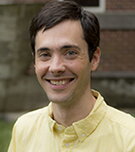
Contact Information
601 South Goodwin Avenue
Urbana, IL 61801
Research Interests
Research Topics
Host-Pathogen Interactions, Molecular Evolution, Molecular Immunology, Regulation of Gene Expression, Virology
Disease Research Interests
Infectious Diseases
Research Description
Understanding viral replication, pathogenesis, and evolution
Influenza virus remains a major global health concern, despite the decades-long existence of a licensed vaccine. This ongoing threat is a direct function of the virus’ remarkable adaptability, which enables it to transmit within and between widely divergent host species while deftly evading herd immunity. Unfortunately, we still know very little about the specific mechanisms that govern influenza virus transmission, pathogenesis, and evolution.
My laboratory is primarily focused on understanding how heterogeneity and collective interactions within virus populations influence broader patterns of viral evolution and infection outcomes. Influenza virus populations are enormously heterogeneous, and most viral particles carry a functionally incomplete set of gene segments and thus cannot replicate independently. Rather than serving as dead-end products, widespread co-infection in vivo allows these incomplete particles to replicate and exchange gene segments through complementation. Collective interactions between heterogeneous particles can have profound effects on the behavior of the population as a whole, and the outcome of infection. We and our collaborators are currently employing a wide range of approaches spanning molecular virology, cell biology, evolutionary biology, single cell microfluidics, bioinformatics, and mathematical modeling to better understand this crucial, under-explored area of virus biology.
We are also interested in understanding the genetics of influenza virus immune escape and transmission, with the overall goal of improving strategies for universal vaccination. The specific factors that govern the continual antigenic evolution of influenza virus within the human population remain poorly understood. We have developed improved methods for ultra-deep viral population sequencing that allow us to dissect the process of antigenic evolution within and transmit between hosts like never before.
Specific areas of study within the lab include:
- Defining how patterns of viral heterogeneity and collective interactions within viral populations influence their evolutionary and pathogenic potential.
- Understanding how cellular heterogeneity and stochastic patterns of antiviral immune induction shape the host response to infection.
- Defining the epistatic interactions between viral gene segments and determining how they influence viral evolution.
- Using single-particle/single-cell analysis to examine how the interplay between viral and host heterogeneity shapes infection outcome.
- Employing ultra-deep population sequencing methods to understand how influenza populations maintain fitness while evading host immunity.
Education
B.A. (Biology), Washington University, 2003
Ph.D (Microbiology & Immunology), University of North Carolina, 2010
Postdoctoral (Viral Immunology), Laboratory of Viral Diseases, NIAID, 2010-2015
Additional Campus Affiliations
Associate Professor, Microbiology
Associate Professor, Carl R. Woese Institute for Genomic Biology
Affiliate, Interdisciplinary Health Sciences Institute
External Links
Recent Publications
Rivera-Cardona, J., Mahajan, T., Thayer, E. A., Kakuturu, N. R., Teo, Q. W., Lederer, J., Rowland, E. F., Heimburger, K., Sun, J., McDonald, C. A., Mickelson, C. K., Langlois, R. A., Wu, N. C., Milenkovic, O., Maslov, S., & Brooke, C. B. (2026). Intrinsic OASL expression governs heterogeneity in interferon induction during influenza A virus infection. Proceedings of the National Academy of Sciences of the United States of America, 123(1), Article e2509560123. https://doi.org/10.1073/pnas.2509560123
Hu, Z., Ai, H., Wang, Z., Huang, S., Sun, H., Xuan, X., Chen, M., Wang, J., Yan, W., Sun, J., Pu, J., Brooke, C. B., Chang, K. C., Sun, Y., & Liu, J. (2025). Impact of inactivated vaccine on transmission and evolution of H9N2 avian influenza virus in chickens. npj Vaccines, 10(1), Article 67. https://doi.org/10.1038/s41541-025-01115-y
Lennon, J. T., Rappuoli, R., Bloom, D. E., Brooke, C., Burckhardt, R. M., Dangour, A. D., Egamberdieva, D., Gronvall, G. K., Lawley, T. D., Morhard, R., Mukhopadhyay, A., Peixoto, R. S., Silver, P. A., Sperandio, V., Stein, L. Y., & Nguyen, N. K. (2025). Microbial solutions for climate change require global partnership. mBio, 16(5). https://doi.org/10.1128/mbio.00778-25
Teo, Q. W., Wang, Y., Lv, H., Oade, M. S., Mao, K. J., Tan, T. J. C., Huan, Y. W., Rivera-Cardona, J., Shao, E. K., Choi, D., Wang, C., Dargani, Z. T., Brooke, C. B., te Velthuis, A. J. W., & Wu, N. C. (2025). Probing the functional constraints of influenza A virus NEP by deep mutational scanning. Cell Reports, 44(1), Article 115196. https://doi.org/10.1016/j.celrep.2024.115196
Farjo, M., Koelle, K., Martin, M. A., Gibson, L. L., Walden, K. K. O., Rendon, G., Fields, C. J., Alnaji, F. G., Gallagher, N., Luo, C. H., Mostafa, H. H., Manabe, Y. C., Pekosz, A., Smith, R. L., McManus, D. D., & Brooke, C. B. (2024). Within-host evolutionary dynamics and tissue compartmentalization during acute SARS-CoV-2 infection. Journal of virology, 98(1). https://doi.org/10.1128/jvi.01618-23